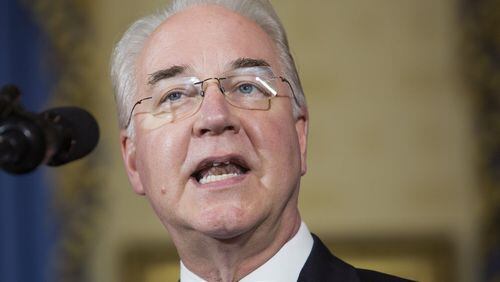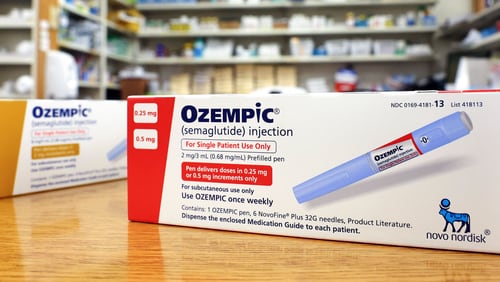Members of Georgia's U.S. House delegation raised and spent millions of dollars ahead of last year's election, but the state's undisputed master of the political money game was former U.S. Rep. Tom Price.
The Roswell Republican spent almost $2.5 million in 2015 and 2016, according to an Atlanta Journal-Constitution analysis of federal filings, nearly twice as much as the state’s second-biggest spender in the House, Gainesville Congressman Doug Collins.
Price did so despite the fact that he faced a virtually unknown Democratic opponent who did not spend a dime on the race beyond Georgia’s $5,220 qualifying fee.
Price ended up soundly defeating media-shy retiree Rodney Stooksbury by 24 points in November, securing what turned out to be an abbreviated sixth term in the House before he was tapped to be President Donald Trump's health secretary. And his Cabinet appointment ended up prompting what quickly became the most expensive congressional race in history between Democrat Jon Ossoff and Karen Handel — but that only came later.
Even though Price faced only token opposition at the ballot box, he fundraised heavily, as is commonplace and expected for members of leadership such as himself. As a member of the tax-writing Ways and Means Committee and chairman of the Budget Committee with a specialty in health policy, Price had a vast national fundraising network that he could tap.
And since Price hadn’t faced any true electoral competition since he was first elected in 2004, he was free to stockpile money and spread it generously to current and would-be political allies, not only on Capitol Hill but in the Georgia Legislature.
Read more:Georgia congressmen spent millions while cruising to re-election
Indeed, that’s what made Price’s spending habits as a Georgia congressman unique. Roughly 43 percent of the money he spent in 2015 and 2016, or more than $1 million, went to political donations — a notable chunk of it to local groups and candidates.
He sent just shy of $650,000 to the National Republican Congressional Committee, the campaign arm of the House GOP. That’s more than double the already large dues that Georgia U.S. Rep. John Lewis, D-Atlanta, and Collins paid their respective parties as members of the Democratic and Republican leadership teams.
Price also donated money to the Republican National Committee and local GOP groups across the state and 6th District, including Cobb County Republican Women and Georgia Young Republicans.
The former orthopedic surgeon contributed tens of thousands of dollars to dozens of Republican candidates and members of the Georgia Legislature, which fueled rumors before his ascendancy to the Cabinet last year that he was eyeing a run for governor. Price sent the maximum $2,600 allowable to state Sens. Jeff Mullis, the chairman of the chamber's Rules Committee, Fran Millar and Majority Leader Bill Cowsert, as well as House Speaker David Ralston and a host of his lieutenants.
By comparison, most Georgia federal lawmakers donated little or no money to lawmakers in the Legislature. Other large campaign expenses for Price last year were for fundraising consulting, mailers and polling. A Price spokesman declined to comment.
Government watchdog groups have long criticized Congress for refusing to end the practice of lawmakers fundraising for re-election and then funneling the money to allies in order to curry political favor, but it's not illegal. Both parties in Georgia have benefited from the system, the AJC previously reported, which has made them disinclined to change the rules.
Coming soon
The Atlanta Journal-Constitution is getting ready to launch a new premium experience for readers across the state who care about Georgia politics, policy and state news. PoliticallyGeorgia will bring you reporting you can’t get anywhere else, thought-provoking opinion writing, and tools to help you navigate the world of government and make your voice heard.
About the Author








